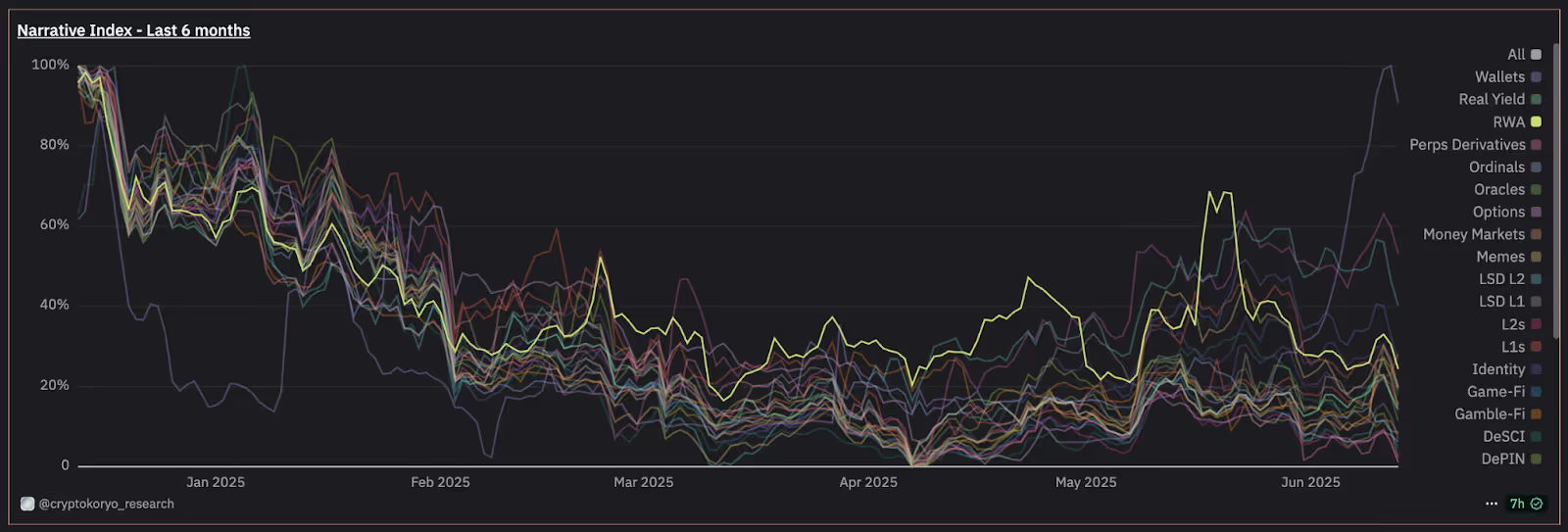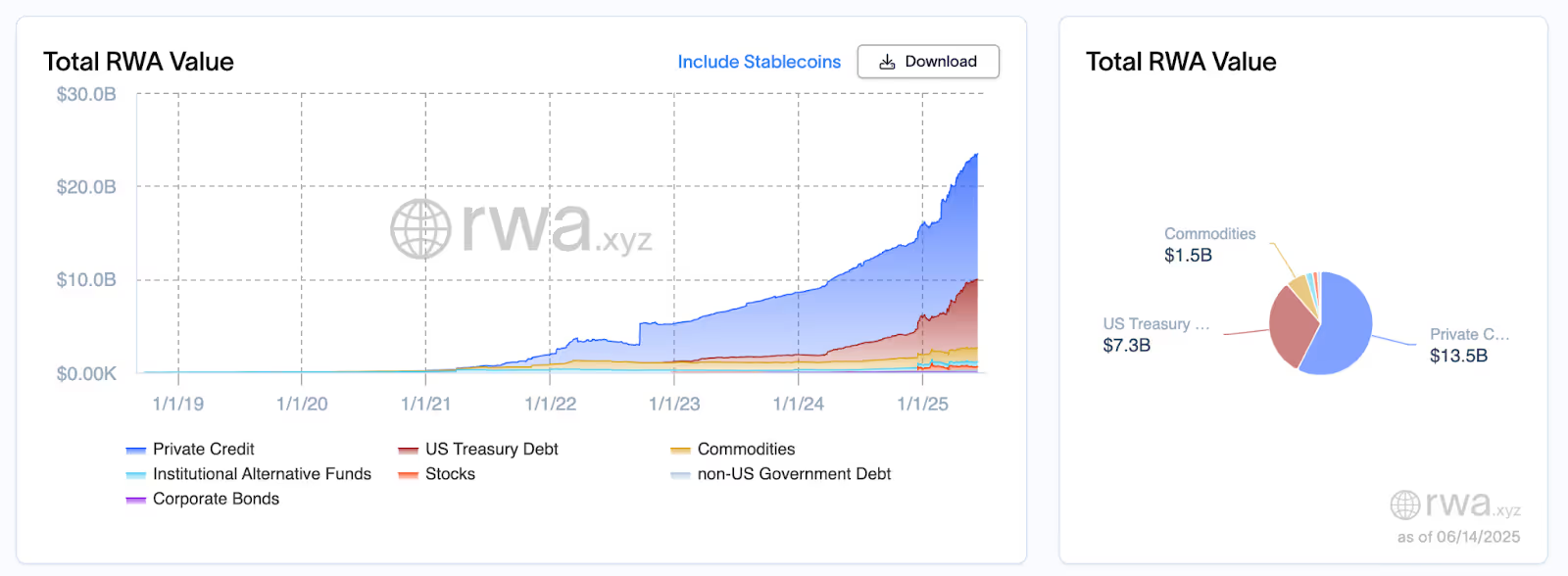The Plumeberg News – From BlackRock on XRP Ledger to Argentina's Regulatory Sandbox
.avif)
The global momentum behind Real World Asset (RWA) tokenization was on full display this week, with significant developments spanning mature financial markets, booming real estate hubs, and emerging economies. Institutional products like tokenized U.S. Treasuries expanded their reach onto new ledgers, driven by giants like BlackRock and Ondo. Meanwhile, Dubai’s property market continues its meteoric rise, bolstered by a strong push towards tokenization. Further south, Argentina has taken a formal step to regulate the space with its first tokenization sandbox, while the Central African Republic's ambitious land tokenization project highlights the high-risk, high-reward nature of frontier market adoption. This week's news paints a vivid picture of a sector evolving on multiple fronts, from blue-chip financial instruments to pioneering, and sometimes controversial, national initiatives.
1)Weekly RWA Highlights
Dubai's Real Estate Sales Hit $18.2B in May, Fueled by Tokenization Momentum and New Regulations
Dubai's vibrant property market recorded a staggering $18.2 billion in sales for May 2025, a figure propelled by growing momentum in real estate tokenization. The surge comes on the heels of new pro-tokenization regulations from the Virtual Assets Regulatory Authority (VARA) and follows a record-breaking $3 billion real estate deal on the blockchain, underscoring the increasing integration of digital asset technology in the city's booming property sector.
Read More: Cointelegraph
BlackRock's BUIDL Fund Leads Tokenized Treasury Market, Reaching New Heights in Institutional Adoption
BlackRock’s BUIDL fund has solidified its position as a leader in the tokenized U.S. Treasury market, with its fund size expanding significantly as of June 2025. This growth highlights the surging institutional appetite for tokenized financial products that offer blockchain efficiency for traditional, low-risk assets. BUIDL's success underscores the critical role established financial players have in driving the mainstream adoption of real world asset tokenization.
Read More: Coincu
Argentina's CNV Launches First Regulatory Sandbox for Tokenization of Securities
Argentina's securities regulator, the Comisión Nacional de Valores (CNV), has officially approved the country's first regulatory sandbox for the tokenization of real world assets. The new framework will initially apply to publicly offered financial trusts and closed-end mutual funds. This marks a significant step by Argentina to formally integrate blockchain technology into its capital markets, aiming to foster innovation, transparency, and efficiency in asset management under a supervised environment.
Read More: The Defiant
Central African Republic's Solana Land Tokenization Plan Faces Memecoin and Deepfake Controversy
The Central African Republic's ambitious plan to tokenize over 1,700 hectares of land on the Solana blockchain has become entangled in controversy. The state-backed initiative has been linked to a memecoin launched on Pump.fun, with questions arising around its governance and the alleged use of AI-generated deepfake videos for promotion. The situation highlights the significant risks and challenges faced when implementing cutting-edge blockchain projects in nations with complex political and economic landscapes.
Read More: Coindoo
2)RWA Market Commentary
This week offers a fascinating split-screen view of the RWA tokenization landscape, showcasing both mature, institutional-led growth and the volatile realities of frontier innovation. On one side, we see the continued institutionalization of "blue-chip" RWAs. The expansion of Ondo's tokenized Treasuries to the XRP Ledger and the dominance of BlackRock's BUIDL fund demonstrate a clear product-market fit for tokenized, low-risk yield products among sophisticated investors. This is the methodical, infrastructure-heavy build-out that brings blockchain's efficiencies to the core of traditional finance. Similarly, Dubai's booming, tokenization-friendly real estate market illustrates how a supportive regulatory environment can supercharge a specific, high-value asset class.
On the other side of the spectrum, the developments in Argentina and the Central African Republic represent the more experimental and unpredictable edge of RWA adoption. Argentina’s creation of a regulatory sandbox is a crucial, positive step—a formal acknowledgment that innovation requires a safe, supervised space to grow. It is the necessary precursor to the kind of market activity seen in Dubai. In stark contrast, the CAR’s land tokenization effort, mired in memecoin controversy and deepfake allegations, serves as a cautionary tale. It underscores how the powerful promise of tokenization can be easily derailed by governance issues and hype cycles, especially when applied to sovereign assets in complex environments. Together, these stories show that while the path for tokenizing traditional financial assets is becoming clearer, the road for digitizing sovereign and physical assets in emerging markets remains a high-risk, high-reward frontier.
3)Narrative Overview
RWA Index Ranking (24.38%)

4)Tokenized Assets Analytics
Global Market Overview:
- Total RWA Onchain: $23.348B (+4.69% from 30d ago)
- Total Asset Holders: 173,998 (+71.44% from 30d ago)
- Total Stablecoin Value: $237.34B (+2.82% from 30d ago)

Conclusion
The global journey toward RWA tokenization is not a monolithic march but a series of parallel, often contrasting, paths. This week's news highlights this diversity perfectly. While established financial players are successfully integrating tokenized U.S. Treasuries into mainstream digital markets and real estate in Dubai thrives with regulatory support, other nations are just beginning their journey. Argentina's move to create a formal sandbox provides a structured path for innovation, while the Central African Republic's project serves as a stark reminder of the potential pitfalls on the frontier. The key takeaway is that the RWA sector is maturing at different speeds across the globe, simultaneously building institutional trust and navigating the complex, sometimes chaotic, process of true technological disruption.
